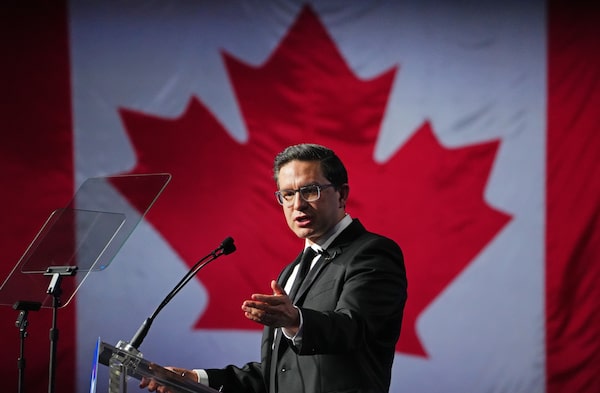
Newly elected Conservative Leader Pierre Poilievre speaks at the Conservative Party of Canada leadership vote, in Ottawa, on Sept. 10.Sean Kilpatrick/The Canadian Press
When he stepped onto the stage at Ottawa’s Shaw Centre for his victory speech, Pierre Poilievre came as a conqueror. The Conservative Party was his.
That was no surprise to him. His team had forecast the scope of his victory.
He hadn’t just convinced the Conservative rank and file. He had ridden a wave, caught on to the angry momentum of February’s truckers’ protest, merged it with economic angst of middle Canada and personified what they wanted. They wanted an unrepentant, always-fight voice for their frustration.
Pierre Poilievre is the new Conservative Party Leader. His policies and career so far
On Saturday night, he wasn’t going to push that away. His victory speech included a lot of his leadership campaign rhetoric. But it wasn’t really the culmination of his leadership campaign – it was the start of his leadership.
He knew he was giving Canadians their first look at the new leader. Here are four things to note about how he did it.
No need to call for healing
There was no doubt that his margin of victory made a mandate, and no need for a long discourse calling for healing in his party.
Mr. Poilievre said he “opened his arms” to supporters of the other candidates, but he declared the party united. He had gracious words for beaten candidates, even lauding Jean Charest for his role in keeping Canada together. But he was thanking Mr. Charest for his service, not asking him to join the new team.
That was never going to happen – Mr. Poilievre, after all, had relentlessly hammered him as a Liberal, effectively saying he’s unwelcome. On Sunday, Mr. Charest quickly put out a six-minute video saying he was going back to the private sector, and though he called for unity, he didn’t praise Mr. Poilievre for anything more than his “energetic” campaign.
There will still be some scars – but Mr. Poilievre doesn’t have to manage any rival’s faction. Leslyn Lewis, who was the standard bearer of social conservatives in the 2020 leadership race, can’t claim to be that any more. Everyone else had been relegated to the margins.
Less convoy, more money
There was a content shift from leadership campaign rallies to leader’s first speech. There was less about pandemic frustrations, and more about economics.
Mr. Poilievre won’t suddenly drop all the grievances of the truckers’ convoy, or culture-war calls – and he didn’t on Saturday night. He promised at one point, to kill the ArriveCan border app and end all remining COVID-19 vaccine mandates.
But he didn’t linger on those things. He toned down stuff that provoked cheers at rallies, leaving out his promise to defund the CBC.
Instead, the focus was economic, from inflation to deficits to taxes. It was heavily centred on the struggles of those of modest means, such as 30-year-olds who can’t afford a home or people “downgrading their diet” because of food prices – and an argument that the cost of government is costing them.
Reach out to Quebec nationalists
There was no wasting time in reaching out to Quebec, with a full-on appeal to nationalist francophones.
Quebec is an electoral weakness for the Conservatives, even though popular CAQ Leader François Legault has led a centre-right government for four years, and the new Quebec Conservative Party is making inroads with anti-lockdown backlash. But Mr. Legault’s strength with francophone voters relies heavily on cultural nationalism, including stricter language laws and a ban on wearing religious symbols for some public servants.
On Saturday, Mr. Poilievre not only told Quebeckers that his children go to a French-language daycare, he promised a smaller federal government would let Quebec control more.
“Conservatives everywhere in Canada have a lot to learn from Quebeckers,” he said in French. “Quebeckers defend their heritage, their culture, and their language. They don’t apologize. The Quebec nation stands up to wokeism.”
Cementing the little-guy image
When the results were announced, it was Anaida Poilievre, not Pierre, who stepped up to the microphone. She introduced the new leader emphasising his ordinary-Joe image, and talking about their shared work-hard-to-get-ahead “values.”
It was Anaida Poilievre’s background, as a Venezuelan immigrant who grew up in working-class East End Montreal, that Mr. Poilievre then wove together with his own personal story of the adopted son of two teachers.
It’s an image that Mr. Poilievre will surely use to contrast Justin Trudeau’s celebrity glamour as the son of a prime minister. Without mentioning Mr. Trudeau, that is what he did: He spoke of Canada as “a country where the son of a teenage mother adopted by two teachers can dare to run for prime minister.”
 Campbell Clark
Campbell Clark